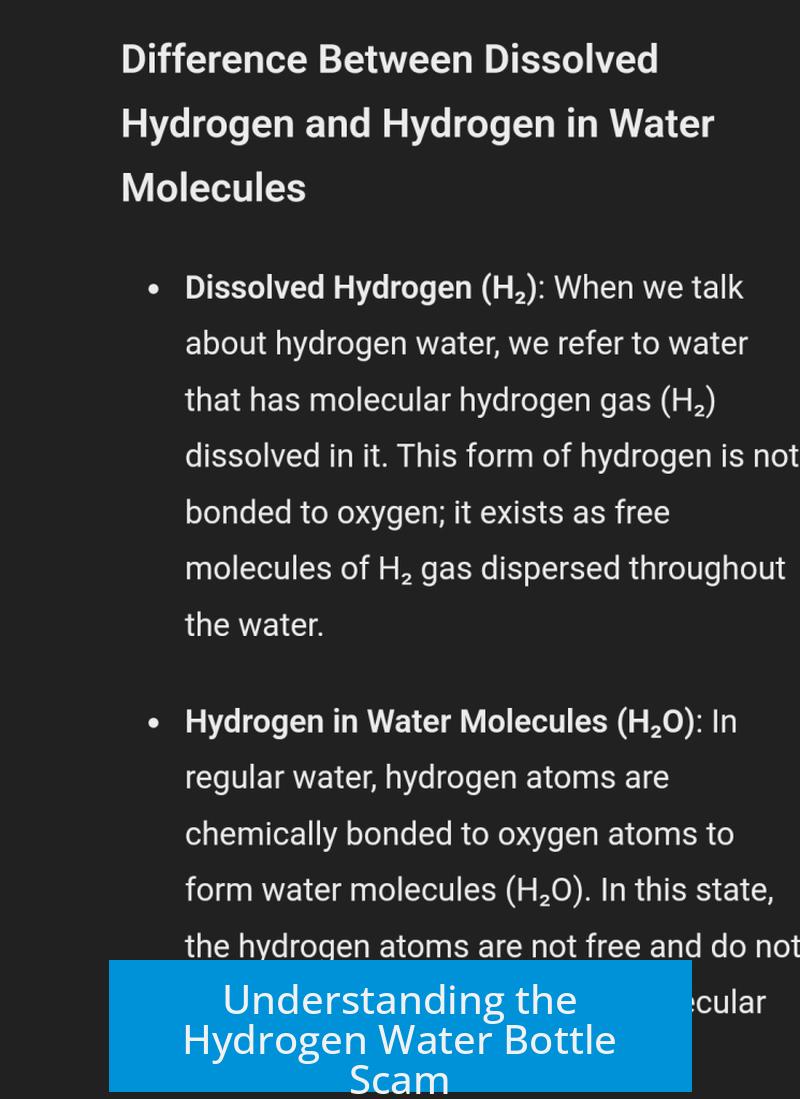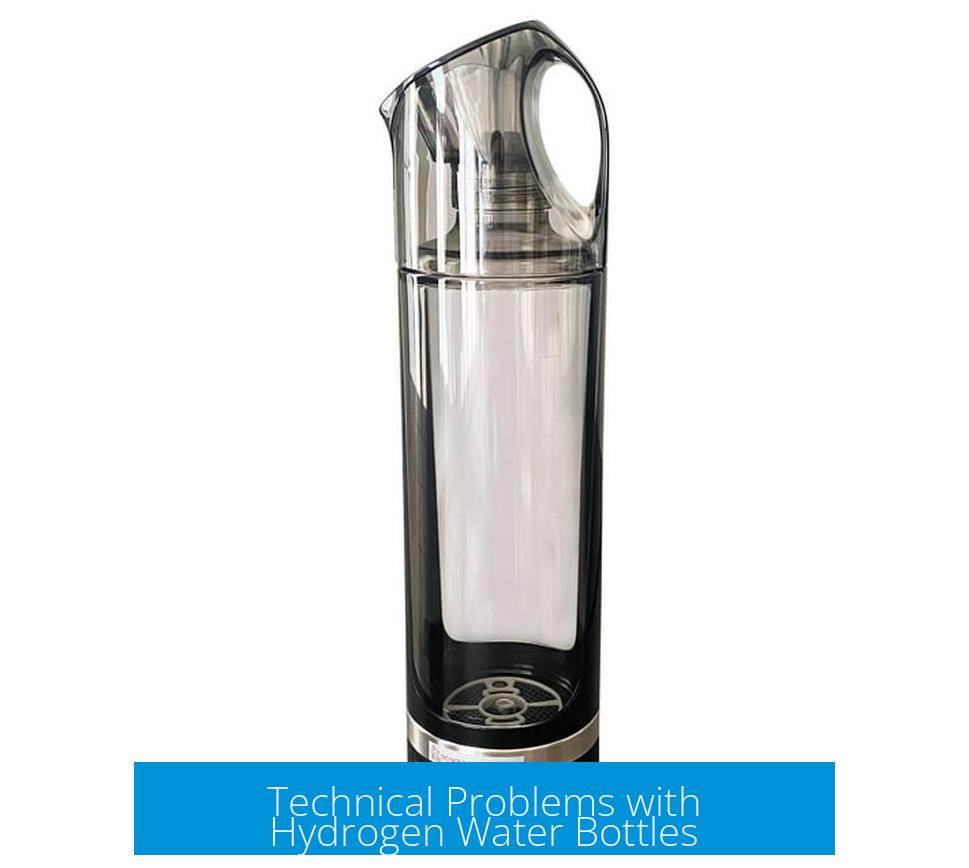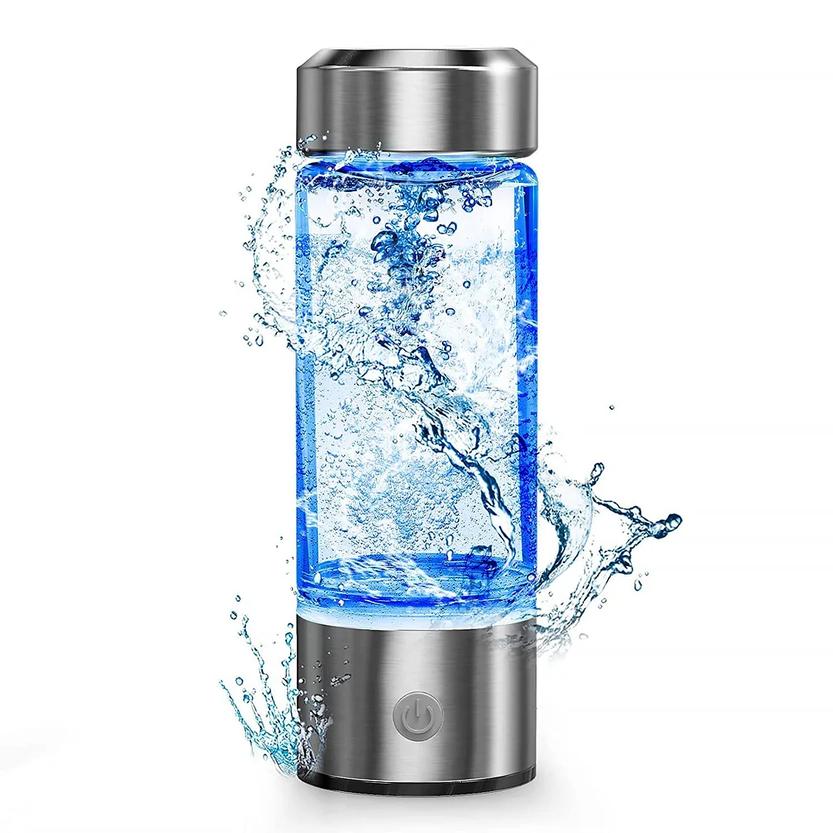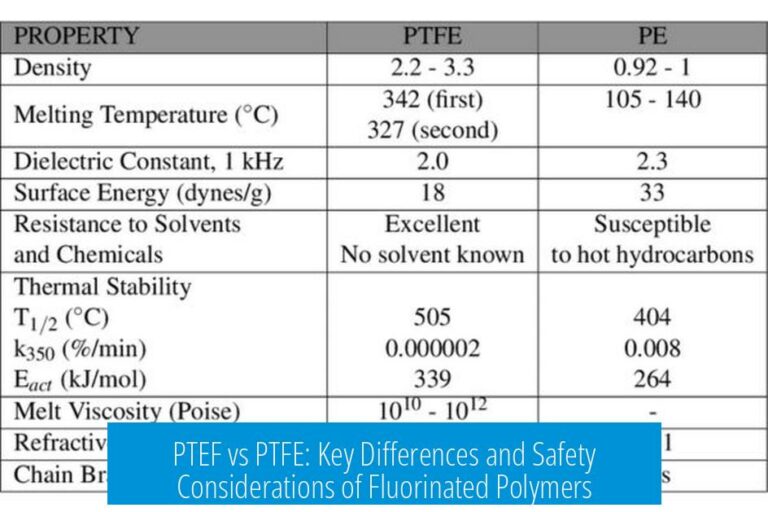Understanding the Hydrogen Water Bottle Scam

The hydrogen water bottle scam centers on misleading claims that these devices provide significant health benefits through hydrogen-enriched water, despite scientific evidence and chemical principles indicating otherwise. This article explains the skepticism, technical issues, marketing tactics, user experiences, and regulatory perspectives related to these products.
Why Hydrogen Water Bottles Are Questioned
Hydrogen (H2) is a simple molecule that exists naturally combined with oxygen as water (H2O). Claims that drinking hydrogen-rich water provides antioxidant benefits or cures various ailments face strong criticism from the scientific community.
- Hydrogen in water does not act as a beneficial antioxidant inside the human body.
- The body already produces dedicated antioxidants to manage free radicals.
- The amount of hydrogen that water can dissolve at room temperature is extremely small—about 1 mg/L (=1 ppm), insufficient for any physiological effect.
- Generating and dissolving extra hydrogen in water typically requires pressure and heat, conditions not met by simple water bottles.
- Marketing often ignores basic chemistry; water is already hydrogen and oxygen chemically combined.
Technical Problems with Hydrogen Water Bottles

Many alleged hydrogen water bottles use poorly designed electrolysis or sonication processes to inject hydrogen into water. These processes show inherent limitations:
- Inefficient Electrolysis: Electrolysis requires high power and pure components—such as platinum-group metal electrodes—to produce hydrogen without contaminants.
- Hydrogen Loss: Even if electrolysis works, hydrogen rapidly escapes from the water into the air if the bottle isn’t airtight.
- Low Hydrogen Solubility: H2 solubility in water limits how much hydrogen can stay dissolved, often much less than claimed.
- Cheap Components: Many products use inexpensive materials, potentially contaminating the water or causing leaks.
Reports indicate some bottles leak and companies offer poor customer service or restrictive return policies, suggesting manufacturing quality issues.
Marketing Strategies and Scam Behavior
Hydrogen water bottles are promoted with extravagant claims such as “double the hydrogen content” or curing diseases. These statements have no solid scientific backing and often rely on hype targeted at vulnerable consumers.
- Advertising frequently exaggerates benefits using pseudoscientific jargon.
- Some sellers resemble historic “snake oil” vendors, exploiting mistrust in conventional medicine.
- Websites and product pages often contain misleading or unverified testimonials.
- Despite dubious claims, some users increase water intake due to bottle novelty, which might improve health indirectly.
From a behavioral standpoint, if a light-up hydrogen bottle encourages drinking more plain water instead of sugary drinks, it may offer indirect benefits through increased hydration alone.
Personal Accounts: Mixed Experiences

User reviews vary widely. Some report improved energy or reduced heartburn after using these bottles. Others experience immediate defects such as leaks or ineffective operation.
- Positive testimonials often attribute benefits to placebo or behavioral changes rather than chemical effects.
- Negative reviews highlight poor build quality and lack of support from manufacturers.
- High-cost purchases without verified benefits have led some to feel scammed.
Scientific and Regulatory Perspectives
Studies on hydrogen water are preliminary and limited. Some early trials suggest possible benefits, but research with larger sample sizes and rigorous methods is necessary.
- A 2023 systematic review questioned claims about hydrogen water, calling for more robust evidence.
- The FDA has issued warning letters to companies promoting unsubstantiated health claims about hydrogen water.
- FDA notices clarify that the safety and effectiveness of such products are not formally established.
This regulatory caution underlines the importance of skepticism about hydrogen water bottle marketing.
Historical Similarities with Other Health Scams

The hydrogen water bottle craze resembles past fads such as magnetic water bottles, “structured” water drops, or “fourth state” water theories. These products often offer no measurable scientific benefit but promise vague health improvements.
Snake oil salesmen adapting to modern products signals continued caution when evaluating new “health revolution” gadgets.
Key Takeaways
- Hydrogen water bottles lack credible scientific support and are unlikely to provide significant health benefits.
- Chemistry limits how much hydrogen can dissolve in water; electrolysis in these devices is often inefficient or flawed.
- Many products have low-quality components, potential contamination risks, and unreliable customer support.
- Marketing claims frequently overstate effects using pseudoscience and misleading testimonials.
- Hydrogen water research remains preliminary; regulatory agencies warn against unverified health claims.
- Consumers should prioritize hydration from plain water and employ proven nutrition over expensive devices.
Hydrogen Water Bottle Scam: The Bubble of False Promises
Are hydrogen water bottles a scam? Yes, most of them are. The hype around these gadgets inflates health benefits that science barely supports. They promise you glowing skin, boundless energy, and curing all sorts of ailments. But behind the shimmer lies a classic case of marketing smoke and mirrors.
Let’s pop open this topic like a fizzy soda and see what bubbles up.
What’s the Big Deal with Hydrogen Water?
Water, as you might recall from science class, consists of hydrogen and oxygen. So why buy a bottle that claims to “add hydrogen” to it? The answer: it literally already has hydrogen. The “H” in H2O stands for hydrogen, and it’s bound in a stable molecule. That’s chemistry for you. Meanwhile, promoters paint hydrogen as a miraculous health aid that “scavenges free radicals” or “boosts energy.”
Here’s the truth: hydrogen gas dissolved in water is inert in the body unless combusted back into water (which would, sadly, not happen in your stomach). Your body already has sophisticated antioxidant systems—no miracle extra from bubbling hydrogen needed.
Wondering where to actually get antioxidants? Try an orange. For just about 50 cents, it gives you more health bang for your buck than these $100 expensive bottles.
Technical Follies: Why These Bottles Don’t Work
Many hydrogen water bottles claim to use electrolysis—splitting water molecules to release hydrogen. But here is the catch: water holds about 1 mg/L of dissolved hydrogen gas at room temperature. That’s roughly one part per million. Tiny. In practice, much of the hydrogen escapes quickly into the air.
Some devices aren’t true electrolysis gadgets; instead, they use low-power sonicators or ultrasonic bubbles. The result? Some fizz and bubbles but no meaningful hydrogen saturation. And guess what? If the bottle isn’t airtight, hydrogen escapes fast. It’s more an entertaining bubble machine than a health tonic.
Worse, cheap components in these devices cost as little as 30 cents for the electronics. If the electrodes aren’t made from expensive platinum group metals, the water may get contaminated with metals from inferior materials. Plus, many users report defects like leaking, and companies show little support to fix them.
Marketing Madness: Selling Health on Hype
Now, let’s talk marketing. Some companies boldly claim your water now magically contains “twice as much hydrogen as oxygen!” That’s scientifically dubious and violates basic chemistry rules. These promises remind us of snake oil salesmen from centuries ago, just with slicker websites and slicker packaging.
Some of the marketing claims come from so-called “health professionals” who sell vitamins and supplements, targeting older adults with promises of cures and vitality. The laughable websites and exaggerated claims make this a modern grift.
At its core, the hydrogen water bottle is arguably an entertainment device marketed to hopeful customers desperate for health fixes. Yet, is it all bad?
Is There Any Good That Comes Out of It?
Surprisingly, if a light-up hydrogen water bottle encourages someone to drink more water instead of sugary drinks, it could have a practical benefit. Hydration is essential, and sometimes, a fun gadget nudges us to sip more often.
Consider placebo effects too. A person feeling more energetic or less burning sensation might genuinely improve their well-being—even if it’s not from dissolved hydrogen but belief. Placebo is a real phenomenon used in medicine.
One user shared, “After a day, I felt more energetic—almost like a stimulant.” Another mentioned six months of use helped with skin dryness and heartburn. Whether these are actual effects of hydrogen or behavior and belief changes remains unclear.
Personal Tales: Tales from Both Sides
Not everyone lives happily ever after with these bottles. One individual got a leaking bottle as a gift and couldn’t get a replacement. Another lamented how buying the cheapest model turned into a scam. A friend reportedly shelled out $1600, influenced by celebrity endorsements, only to regret it later.
These stories expose the risks of spending big on unproven tech—and reinforce the importance of skepticism and research.
Science Weighs In: Still a Gray Area
What about scientific research? Some studies suggest potential benefits of hydrogen-rich water, possibly for pain relief or inflammatory conditions. For example, a systematic review found preliminary encouraging results but emphasized the need for larger, rigorous trials.
However, current science struggles to explain how dissolved hydrogen works biologically with solid proof. More research is necessary before calling it a health revolution or a hoax.
Meanwhile, authorities like the FDA have issued warning letters to certain companies exaggerating health claims or using faulty marketing tactics. These regulatory actions signal caution about such products.
History’s Lessons: Just Another Fad
The hydrogen water bottle scam fits a long tradition of health fads promising miraculous cures. Remember the old days of water “magnetizers,” or “fourth state of water” nonsense? These gimmicks surface repeatedly, portraying pseudoscience as breakthrough health solutions.
Sadly, snake oil salesmen today use technology-savvy marketing to prey on vulnerability. The format changes, but the core pattern stays the same.
So What Should You Do?
- Be Informed: Understand the science before trusting health claims. Hydrogen water bottles won’t replace fruits and veggies or proven treatments.
- Don’t Overspend: These devices often cost hundreds with dubious benefit. For the price of one, buy real food rich in antioxidants.
- Watch for Quality: If you insist on trying, review product quality and return policies carefully. Avoid brands that ignore defects or complaints.
- Hydrate Well: Focus on drinking clean water regularly. Whether from a fancy gadget or tap, hydration matters more than hydrogen saturation.
- Consider Placebo: Feeling better counts. If the bottle helps you drink more H2O, it’s a win—even if it’s psychological.
- Ignore Hype: Don’t fall for exaggerated promises or celebrity endorsements. Your wallet will thank you.
Final Pondering
Why do we chase magic bullets in wellness? Maybe it’s human nature, or the desire for a quick fix. Hydrogen water bottles tap into that craving. But science reminds us that a 50-cent orange often beats a $100 gimmick.
Would you rather pay for a bubble machine with a fancy label or invest in real health habits? The choice is yours—but a skeptic’s eye keeps your feet on the ground and wallet in your pocket.
So next time you see a glowing bottle claiming the water inside “has more hydrogen than oxygen,” smile, drink your ordinary water, and save your money for something that truly nourishes your body.
What is the main reason hydrogen water bottles are considered a scam?
Hydrogen does not provide the health benefits claimed. Your body’s antioxidants already handle free radicals. Water naturally contains hydrogen and oxygen, so adding hydrogen makes little difference. The devices often fail to produce effective hydrogen levels.
Can these bottles actually produce hydrogen in water?
Most use weak electrolysis or sonicators that barely dissolve hydrogen. Hydrogen gas escapes quickly because water holds very little. Without airtight design, the claimed hydrogen content is mostly fake or temporary bubbles.
Are there any risks from using these hydrogen water bottles?
Some devices may leach metals if they use poor electrodes. Manufacturing is often low quality, leading to leaks and defects. Customer support tends to be unhelpful with replacements or refunds.
Why do some users claim benefits from hydrogen water bottles?
Placebo effect explains many positive reports. Some people feel more energized or hydrated when drinking more water. Drinking increased water alone, regardless of hydrogen content, can improve wellbeing.
What should consumers watch out for when encountering hydrogen water bottle marketing?
Beware of exaggerated claims like “twice as much hydrogen” or miracle cures. Marketing often targets vulnerable groups. Look for scientific evidence and FDA warnings before spending money.




Leave a Comment